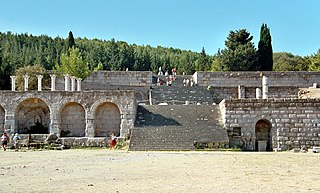The Antigonid dynasty was a dynasty of Hellenistic kings descended from Alexander the Great's general Antigonus I Monophthalmus.

Macedonia or Macedon was an ancient kingdom on the periphery of Archaic and Classical Greece, and later the dominant state of Hellenistic Greece. The kingdom was founded and initially ruled by the royal Argead dynasty, which was followed by the Antipatrid and Antigonid dynasties. Home to the ancient Macedonians, the earliest kingdom was centered on the northeastern part of the Greek peninsula, and bordered by Epirus to the west, Paeonia to the north, Thrace to the east and Thessaly to the south.

Asclepeions were healing temples located in ancient Greece, dedicated to Asclepius, the first doctor-demigod in Greek mythology. Asclepius was said to have been such a skilled doctor that he could even raise people from the dead. So stemming from the myth of his great healing powers, pilgrims would flock to temples built in his honor in order to seek spiritual and physical healing.

In ancient Greek religion, Telesphorus was a son of Asclepius. He frequently accompanied his sister, Hygieia. He was a dwarf whose head was always covered with a cowl hood or cap.

Demetrius I, called Poliorcetes, son of Antigonus I Monophthalmus and Stratonice, was a Macedonian Greek nobleman, military leader, and finally king of Macedon. He belonged to the Antigonid dynasty and was its first member to rule Macedonia. In 295/4 after Athens' capitulation, Demetrius formed a new government which espoused a major dislocation of traditional democratic forms, which anti Macedonian democrats would have called oligarchy. The cyclical rotation of the secretaries of the Council and the election of archons by allotment, were both abolished. In 293/3 - 293/2 B.C., two of the most prominent men in Athens were designated by the Macedonian king, Olympiordoros and Phillipides of Paiania. The royal appointing is implied by Plutarch who says that " he established the archons which were most acceptable to the Demos. The practice was later adopted by his son, Antigonos Gonatas which democrats like Stratokles could also take part."
Demetrius II Aetolicus son of Antigonus II Gonatas and Phila, reigned as King of Macedonia from the winter of 239 to 229 BC. He belonged to the Antigonid dynasty and was born in 275 BC.

Perseus was the last king (Basileus) of the Antigonid dynasty, who ruled the successor state in Macedon created upon the death of Alexander the Great. He also has the distinction of being the last of the line, after losing the Battle of Pydna on 22 June 168 BC; subsequently Macedon came under Roman rule.

Philip V was king (Basileus) of the ancient Kingdom of Macedonia from 221 to 179 BC. Philip's reign was principally marked by an unsuccessful struggle with the emerging power of the Roman Republic. He would lead Macedon against Rome in the First and Second Macedonian Wars, losing both but allying with Rome in the Roman-Seleucid War towards the end of his reign.

Alexander IV, erroneously called sometimes in modern times Aegus, was the son of Alexander the Great and Princess Roxana of Bactria.

Antipater was a Macedonian general and statesman under kings Philip II of Macedon and Alexander the Great, and father of King Cassander. In 320 BC, he became regent of all of Alexander the Great's Empire.

Trikala is a city in northwestern Thessaly, Greece, and the capital of the Trikala regional unit. The city straddles the Lithaios river, which is a tributary of Pineios. According to the Greek National Statistical Service, Trikala is populated by 81,355 inhabitants (2011), while in total the Trikala regional unit is populated by 131,085 inhabitants (2011).

Epidaurus was a small city (polis) in ancient Greece, on the Argolid Peninsula at the Saronic Gulf. Two modern towns bear the name Epidavros:Palaia Epidavros and Nea Epidavros. Since 2010 they belong to the new municipality of Epidaurus, part of the regional unit of Argolis. The seat of the municipality is the town Lygourio.

In antiquity, Paeonia or Paionia was the land and kingdom of the Paeonians (Παίονες).

The Antipatrid dynasty was a dynasty of the ancient Greek kingdom of Macedon founded by Cassander, the son of Antipater, who declared himself King of Macedon in 302 BC. This dynasty did not last long; in 294 BC it was swiftly overthrown by the Antigonid dynasty.
Nicomachus was the father of Aristotle.
Darrhon or Darron (Greek:Δάῤῥων) was a Paeonian god of healing, whose cult was adopted by the ancient Macedonians, as mentioned by Hesychius as Macedonian Daemon and attested hapax in one inscription of Pella c. 200-150 BC.
Calindoia or Kalindoia was an ancient Bottiaean city in Mygdonia. The name also comes down to us in the form Calindaea. The town also bore the names Alindoia and Tripoiai.













